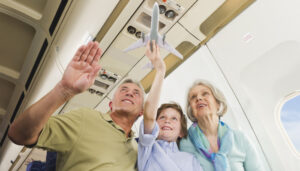3 Tips For Safely Traveling With An Elderly Loved One

While traveling in general can be a stressful and sometimes dangerous situation, hitting the road with an elderly loved one can throw some additional hurdles into your path. But with the right planning and attitude, traveling with an older friend or family member can be just as enjoyable as journeying with any other travel mate.
To help you see how this can be done, here are three tips for safely traveling with an elderly loved one.
Schedule In Down Time
As people age, it becomes much easier for them to get tired and worn out while traveling. Knowing this, Renata Gelman, a contributor to AgingCare.com, advises that you consciously schedule more down time into your travel plans when you’re going with an elderly loved one.
By planning fewer activities during the day and planning to end your adventures earlier than you otherwise might, you’ll ensure that your loved one and travel companion can physically and mentally keep up with you. And because travel can easily tire anyone out, regardless of their age, you might find that you enjoy taking a break in the middle of the day, too.
Keep Their Meds In Check
One thing that you don’t have to have to worry about when traveling with your elderly loved one is any issues with their medications. As a result, it’s virtual that you get everything with their medication or other medical equipment squared away well before you plan to leave on any kind of trip.
In some instances, getting their medications together might entail speaking with their caregiver if they’re not living with you or living on their own anymore. Once you have all the information and medication they’ll need to have on your trip together, Smarter Travel advises that you always pack their medication in a carry-on bag so that it won’t easily get lost. Additionally, you should plan to have at least a few extra days of medication on-hand so that, in the event that things don’t go as planned, you can have easy access to the medication they’ll need.
Choose The Right Accommodations
If your elderly loved one has any kind of mobility issues, you’ll want to be extra careful about the accommodations that you set up. For example, Joy Intriago, a contributor to SeniorsMatter.com, shares that it’s best for most seniors to get a hotel room on the ground floor and close to an entrance. Along with this, you should also try to find accommodations close to the places you’ll be visiting during the day. Then, if you need to take a break in the middle of the day, it’s easy to head back to your accommodations without wasting a lot of time in transit.
If you’re planning to travel with your elderly loved one in the future, consider using the tips mentioned above to help you do so safely and wisely.
